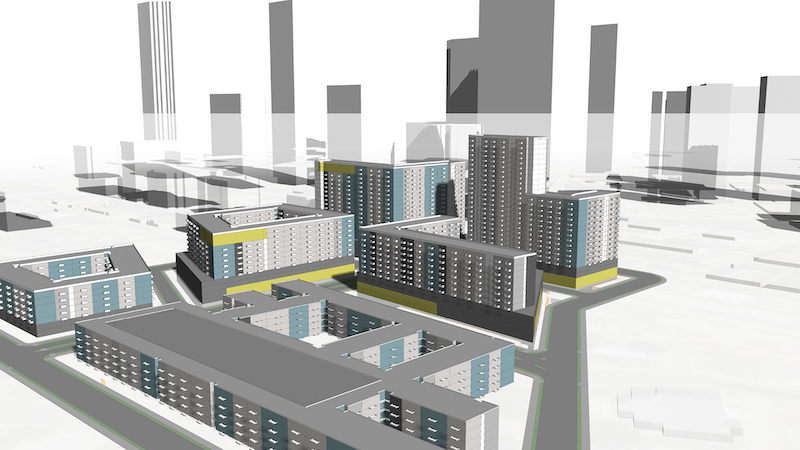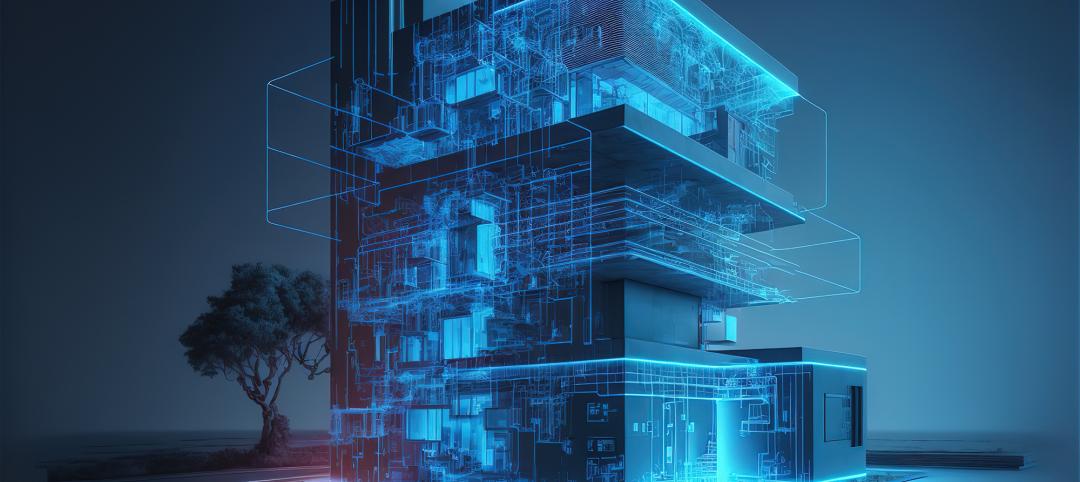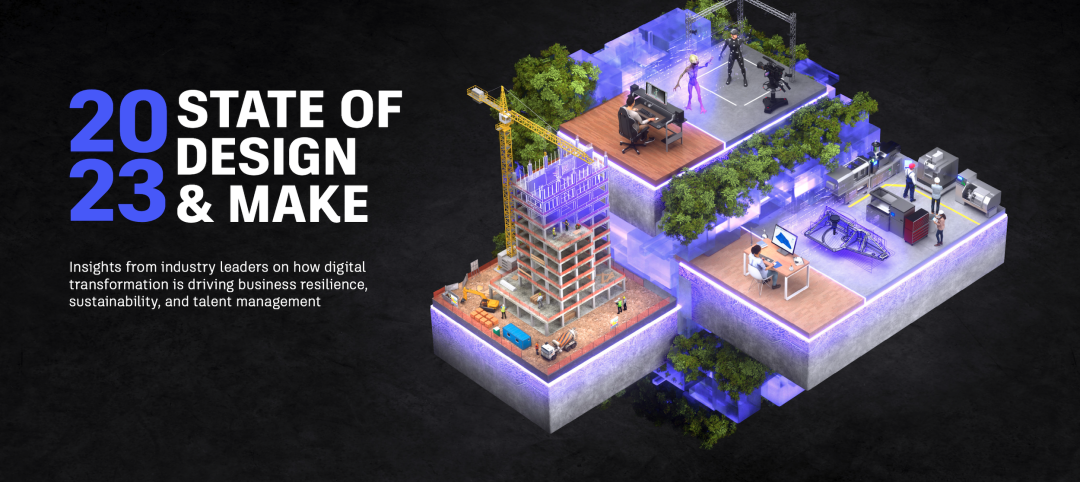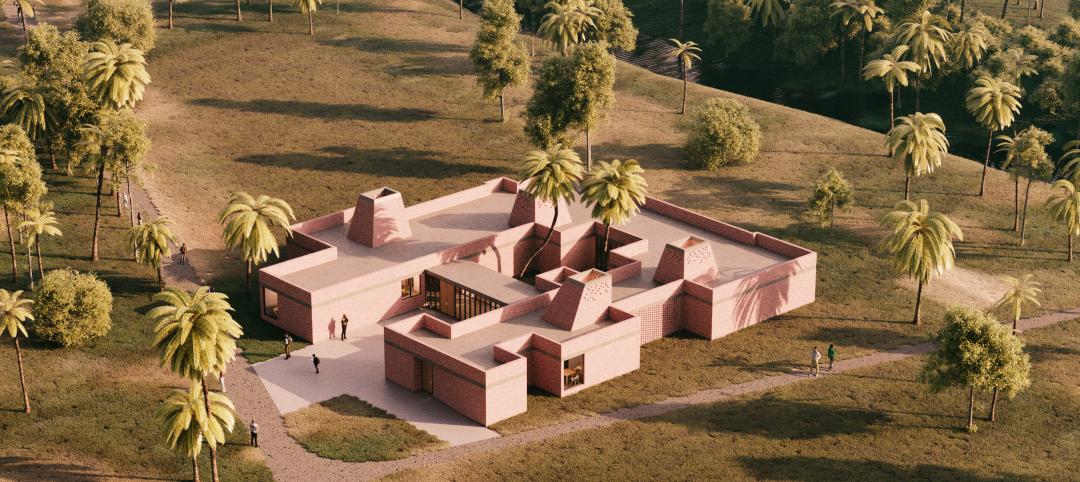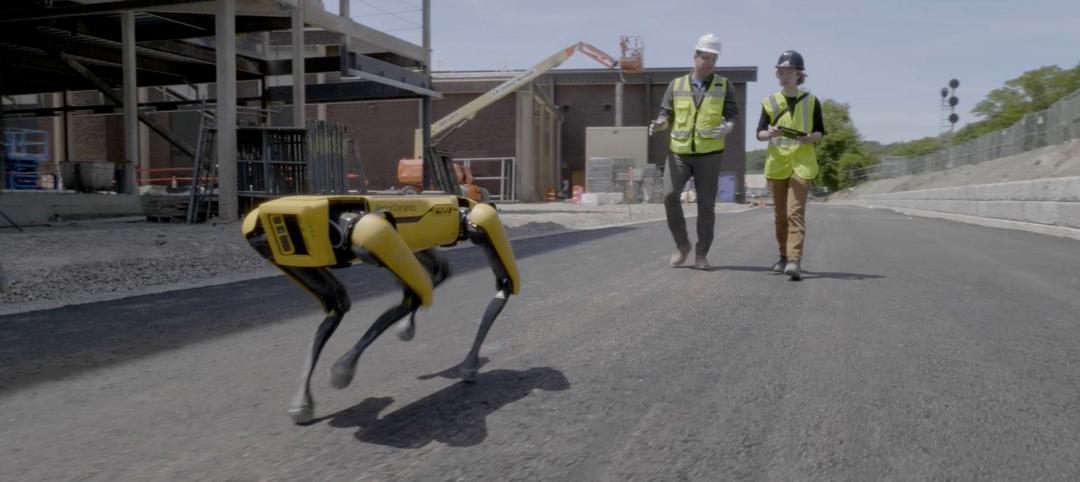Testfit
Dallas, Texas
Founded: 2017
Founders: Clifton Harness (CEO), Ryan Griege (CTO)
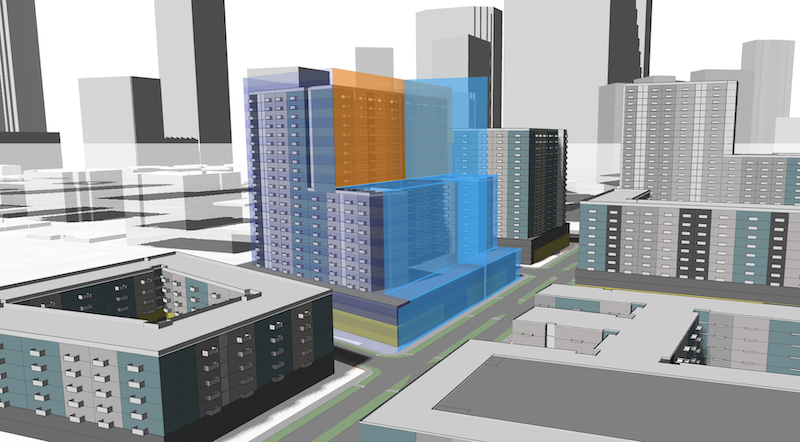 Structures can be generated in seconds with TestFit by simply inputting a building’s parameters. Building types and unit styles can be swapped instantly, massing adjustments can be made on the fly, and multiple sites can be reconfigured simultaneously.
Structures can be generated in seconds with TestFit by simply inputting a building’s parameters. Building types and unit styles can be swapped instantly, massing adjustments can be made on the fly, and multiple sites can be reconfigured simultaneously.
TestFit uses a data-driven approach to smart urban planing and removes barriers in the adoption of generative design. TestFit helps real estate developers, architects, and urban planners conduct feasibility studies and test fit sites for multifamily, hotel, modular, parking, and office development. Using proprietary AI algorithms, the company claims results can be produced in seconds. Building simulations can be run using multiple parameters such as geolocation and 3D contest building to build on a site’s GIS data, user-generated building schemes for comparative analysis, and time-of-day shadow generation. Building typologies can be selected from presets that include wrap, donut, tower, hotel, and podium or they can be created custom by users. TestFit data can be exported to Sketchup, integrated with Dynamo/Revit, and have 3D views exported for PDF. In 2020, TestFit announced $2 million in seed funding from Parkway Venture Capital.
Buildots
Tel Aviv, Israel
Founded: 2018
Founders: Aviv Leibovici (CPO), Roy Danon (CEO), Yasir Sudry (CTO)
Buildots was designed to enable maximum control of construction processes with minimal effort. The solution uses 360-degree cameras mounted to project managers’ hardhats to create a digital twin of the construction site and turn every site walk into process data. Once access to updated schedules and designs are loaded into the platform, Buildots uses artificial intelligence to automatically analyze and map all of the files to produce a detailed digital construction program to be tracked by the system. The process data is automatically aggregated and compared to the expected status of the project.
Buildots can help track and identify project loose ends, analyze project progress, calculate expected payments, and detect errors. In order to ensure a higher degree of accuracy and the most valuable insights, the Buildots algorithm is augmented with manual analysis and assistance during the initial weeks of a project. The platform includes features such as automated video analysis, per-trade throughput and progress analysis, a consolidated project view with “percent complete" and identification of the most urgent issues, and on-demand project status and gap, both detailed and aggregated. Additionally, Buildots can be easily integrated into existing management workflows.
AI Clearing
Austin, Texas
Founded: 2020
Founders: Michael Mazur (CEO), Adam Wisniewski (CTO)
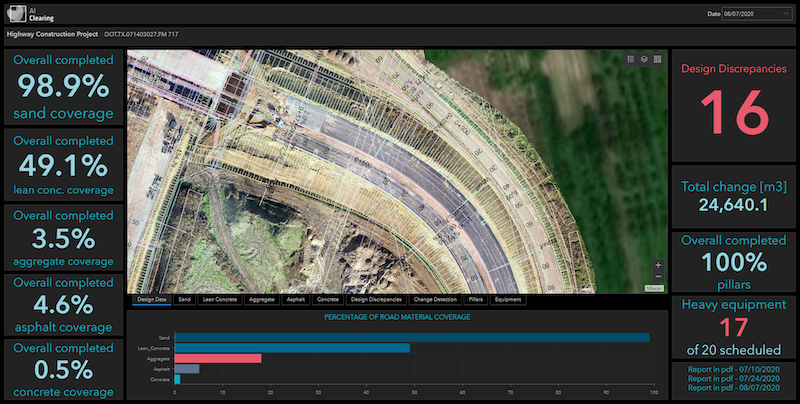 The AI Clearing dashboard (below) for a highway construction project. The dashboard is interactive and fully customizable for each project. Reports are also available in PDF format.
The AI Clearing dashboard (below) for a highway construction project. The dashboard is interactive and fully customizable for each project. Reports are also available in PDF format.
AI Clearing is an artificial intelligence-powered construction progress monitoring solution meant to help companies track the progress of work on their large civil engineering project sites. Data from schedules, CAD, BIM, and drones is used and analyzed by artificial intelligence and then sent back to the client in the form of a dashboard. This dashboard tracks metrics such as utilization of materials, completion or various layers of road surface, and the number of structures erected while also identifying even the smallest discrepancies with the design. Analyzing this data could take a human employee 20 days or more, but AI Clearing is able to do the job in 20 minutes.
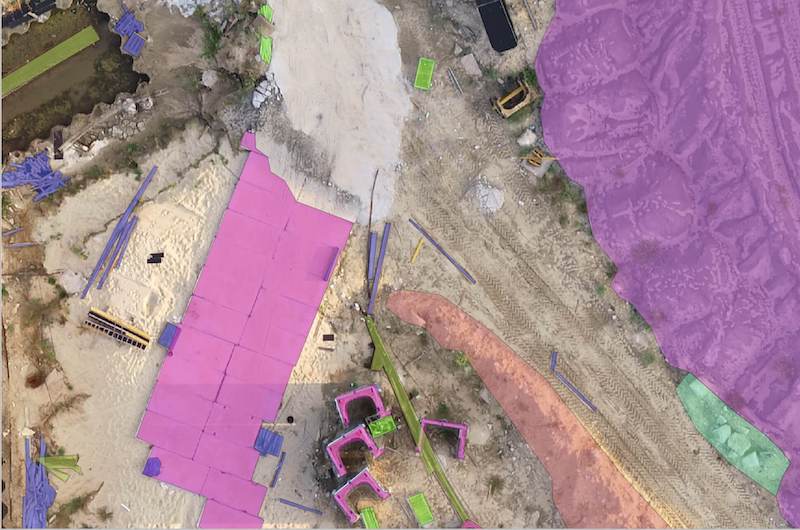 An example of an overhead drone photo with objects color-coded.
An example of an overhead drone photo with objects color-coded.
“We’ve realized that construction companies don’t want to spend a lot of time setting up systems, and they definitely don’t want to pay for yet another software license or subscription,” said Michael Mazur, CEO, Co-Founder, AI Clearing. “That’s why we structured the product the way we did. There’s one fee per project. It takes about four hours to set up the transfer of data from out clients and after that it’s automated. We pull the information in and send it back to the client in the form of analysis that’s displayed on dashboards for as many users as they want.”
Current clients include PCL Construction in the U.S. and Canada, and the French construction group Vinci. AI Clearing recently completed a $2 million seed round in December 2020 that was led by Tera Ventures from Estonia. Co-investors included Venture Partners, Innovation Nest, and other funds from places including Australia.
Related Stories
AEC Tech | May 9, 2023
4 insights on building product manufacturers getting ‘smart’
Overall, half of building product manufacturers plan to invest in one or more areas of technology in the next three years.
Sustainability | May 1, 2023
Increased focus on sustainability is good for business and attracting employees
A recent study, 2023 State of Design & Make by software developer Autodesk, contains some interesting takeaways for the design and construction industry. Respondents to a survey of industry leaders from the architecture, engineering, construction, product design, manufacturing, and entertainment spheres strongly support the idea that improving their organization’s sustainability practices is good for business.
AEC Tech | May 1, 2023
Utilizing computer vision, AI technology for visual jobsite tasks
Burns & McDonnell breaks down three ways computer vision can effectively assist workers on the job site, from project progress to safety measures.
AEC Tech Innovation | Apr 27, 2023
Does your firm use ChatGPT?
Is your firm having success utilizing ChatGPT (or other AI chat tools) on your building projects or as part of your business operations? If so, we want to hear from you.
Design Innovation Report | Apr 19, 2023
HDR uses artificial intelligence tools to help design a vital health clinic in India
Architects from HDR worked pro bono with iKure, a technology-centric healthcare provider, to build a healthcare clinic in rural India.
Resiliency | Apr 18, 2023
AI-simulated hurricanes could aid in designing more resilient buildings
Researchers at the National Institute of Standards and Technology (NIST) have devised a new method of digitally simulating hurricanes in an effort to create more resilient buildings. A recent study asserts that the simulations can accurately represent the trajectory and wind speeds of a collection of actual storms.
3D Printing | Apr 11, 2023
University of Michigan’s DART Laboratory unveils Shell Wall—a concrete wall that’s lightweight and freeform 3D printed
The University of Michigan’s DART Laboratory has unveiled a new product called Shell Wall—which the organization describes as the first lightweight, freeform 3D printed and structurally reinforced concrete wall. The innovative product leverages DART Laboratory’s research and development on the use of 3D-printing technology to build structures that require less concrete.
Smart Buildings | Apr 7, 2023
Carnegie Mellon University's research on advanced building sensors provokes heated controversy
A research project to test next-generation building sensors at Carnegie Mellon University provoked intense debate over the privacy implications of widespread deployment of the devices in a new 90,000-sf building. The light-switch-size devices, capable of measuring 12 types of data including motion and sound, were mounted in more than 300 locations throughout the building.
Architects | Apr 6, 2023
New tool from Perkins&Will will make public health data more accessible to designers and architects
Called PRECEDE, the dashboard is an open-source tool developed by Perkins&Will that draws on federal data to identify and assess community health priorities within the U.S. by location. The firm was recently awarded a $30,000 ASID Foundation Grant to enhance the tool.
AEC Tech | Mar 14, 2023
Skanska tests robots to keep construction sites clean
What if we could increase consistency and efficiency with housekeeping by automating this process with a robot? Introducing: Spot.


